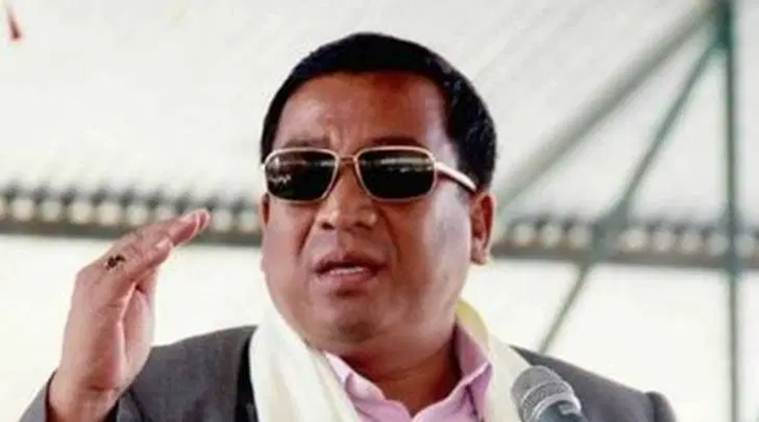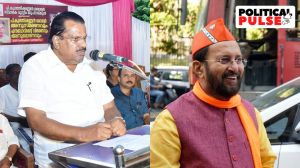- India
- International
Supreme Court invokes special powers, removes Manipur minister
The apex court, while delivering its order, said it “went out of our way to give the Hon’ble Speaker a chance to perform his functions under the Tenth Schedule to the Constitution of India” and decide the matter.
 Manipur Forest Minister Thounaojam Shyamkumar Singh. (Source: Twitter/@ShyamkumarTh)
Manipur Forest Minister Thounaojam Shyamkumar Singh. (Source: Twitter/@ShyamkumarTh)
MARKING A first, the Supreme Court Wednesday removed Manipur Minister Thounaojam Shyamkumar Singh, against whom disqualification petitions were pending before the Speaker since 2017, from the state cabinet and restrained him “from entering the Legislative Assembly till further orders”.
A bench of Justices R F Nariman and S Ravindra Bhat said it was “constrained” to invoke the court’s extraordinary powers under Article 142 of the Constitution, “given the extraordinary facts” in the case.
Singh became an MLA in 2017 on a Congress ticket before switching to the BJP to become Minister for Town Planning, Forest and Environment, and Horticulture and Soil Conservation, in the coalition government headed by N Biren Singh.
The apex court’s ruling came on an appeal against a Manipur High Court order on a petition seeking directions to Speaker Y Khemchand to decide the disqualification pleas within a reasonable period of time.
On January 21, a three-judge Supreme Court Bench headed by Justice Nariman had asked the Speaker to decide the disqualification petitions within four weeks. The deadline was not met, and on March 3, Additional Solicitor General Madhavi Divan, appearing for the Speaker, had submitted that a detailed petition would be filed in ten days.

On Wednesday, Solicitor General Tushar Mehta urged the court to defer the hearing till March 28, saying the Speaker would give a ruling that day. However, Senior Advocate Kapil Sibal, appearing for the appellants, requested the court to decide the matter without further delay.
The apex court, while delivering its order, said it “went out of our way to give the Hon’ble Speaker a chance to perform his functions under the Tenth Schedule to the Constitution of India” and decide the matter.
The anti-defection law, referred to as the Tenth Schedule, was added to the Constitution through the Fifty Second (Amendment) Act, 1985.
On September 8, 2017, while hearing the matter, the Manipur High Court had stated that it cannot pass any order as the question of whether a High Court can direct a Speaker to decide on a disqualification petition within a time frame is pending before a Supreme Court Bench.
On January 29, 2018, the appellant again moved the High Court, which concluded on July 23, 2019, that the Speaker is a quasi-judicial authority who is required to take a decision within reasonable time — much less than five years, the prescribed term of the House.
The High Court held that if the remedy provided in the Tenth Schedule is found to be ineffective due to deliberate inaction or indecision on the part of the Speaker, it cannot be denied jurisdiction to issue an appropriate writ.
The High Court, in this matter, found grounds for disqualification under the Tenth Schedule but stopped short of issuing directions as the question was pending before the Supreme Court.
On January 21, the Supreme Court said the “Parliament may seriously consider amending the Constitution to substitute the Speaker of the Lok Sabha and Legislative Assemblies as arbiter of disputes concerning disqualification which arise under the Tenth Schedule with a permanent Tribunal headed by a retired Supreme Court Judge or a retired Chief Justice of a High Court, or some other outside independent mechanism, to ensure that such disputes are decided both swiftly and impartially, thus giving real teeth to the provisions contained in the Tenth Schedule, which are so vital in the proper functioning of our democracy”.
The court had said that “the Speaker, in acting as a Tribunal under the Tenth Schedule, is bound to decide disqualification petitions within a reasonable period”, which “will depend on the facts of each case…”
Article 212 of the Constitution bars courts from inquiring into proceedings of the Legislature. In this case, however, prompted by the fact that the Speaker’s conduct has been called into question on several occasions, the court invoked Article 142, which allows the Supreme Court to pass any order necessary for doing complete justice in any cause or matter.
In November 2016, a two-judge bench of the Supreme Court, comprising justices R K Agarwal and Nariman, while hearing a similar case involving the Telangana Speaker, had referred the issue to a Constitution Bench.
In the Manipur Assembly election of 2017, the Congress won 28 seats and the BJP 21. With support from rebel MLAs and other parties, Biren Singh was able to form a BJP-led government.
Apr 26: Latest News
- 01
- 02
- 03
- 04
- 05































